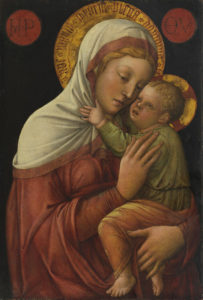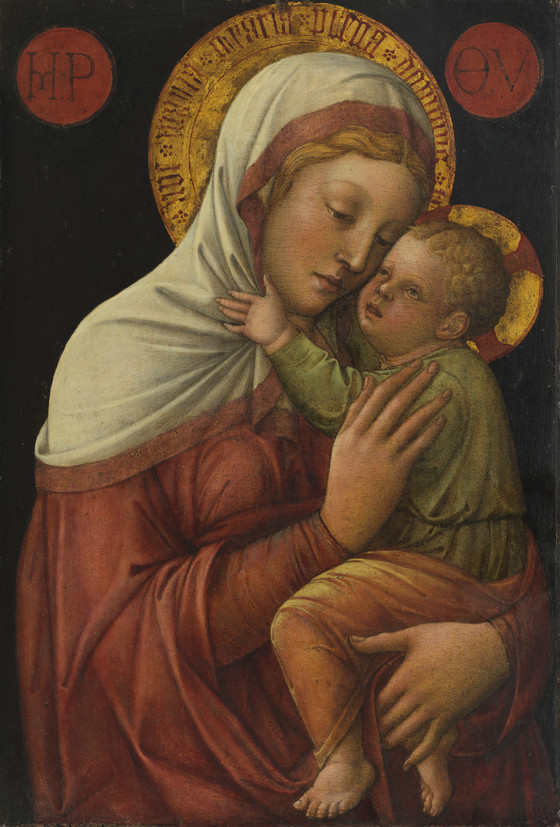
Central idea: Like Mary, ponder what God has done for us. Doctrine: Jesus submits to the Law, and perfects it. Practical application: Living like a Child of God.
The LORD said to Moses:“Speak to Aaron and his sons and tell them:This is how you shall bless the Israelites.Say to them:The LORD bless you and keep you!The LORD let his face shine uponyou, and be gracious to you!The LORD look upon you kindly andgive you peace!So shall they invoke my name upon the Israelites,and I will bless them.”
- If Aaron and his sons, priests of the Israelites, could bestow God’s blessings on Israel, how much more can Mary the Mother of God bestow God’s blessings on her spiritual children in Christ?
- Mary, pray for us sinners to receive every blessing, every good, that the Lord has to give us.
Responsorial Psalm Ps 67:2-3, 5, 6, 8
R. May God bless us in his mercy.
May God have pity on us and bless us;
may he let his face shine upon us.
So may your way be known upon earth;
among all nations, your salvation.May the nations be glad and exult
because you rule the peoples in equity;
the nations on the earth you guide.May the peoples praise you, O God;
may all the peoples praise you!
May God bless us,
and may all the ends of the earth fear him!
- God has blessed Mary above all other created persons and she wants nothing more than to share those blessings with us.
- So, through Mary’s motherly intercession we ask
- God for forgiveness (“have pity on us”),
- grace (“let his face shine upon us”),
- knowledge of the truth (“may your way be known”),
- joy (“be glad and exult”),
- and justice (“you rule the peoples in equity”).
- We ask this for everyone (“among all nations”).
- And we ask for everyone to return thanks and adoration to God for these blessings (“may all the peoples praise you!”).
Reading 2 Gal 4:4-7
Brothers and sisters:
When the fullness of time had come, God sent his Son,
born of a woman, born under the law,
to ransom those under the law,
so that we might receive adoption as sons.
As proof that you are sons,
God sent the Spirit of his Son into our hearts,
crying out, “Abba, Father!”
So you are no longer a slave but a son,
and if a son then also an heir, through God.
- Although Jesus was a Jew who was born, raised, and lived as a Jew–as was St. Paul–by law Paul does not primarily mean the Jewish law, the Law of Moses. He means the moral law in general, which all human beings have an obligation to obey but which none of us were, are not, and will not be able to obey.
- That is why we need to be ransomed. We are imprisoned by our sins and by our inclination to sin.
- Christ saves us from sin (he ransoms us), he also sanctifies us (makes us adoptive sons of God who, like him, call God “Abba, Father”).
Gospel Lk 2:16-21
The shepherds went in haste to Bethlehem and found Mary and Joseph,
and the infant lying in the manger.
When they saw this,
they made known the message
that had been told them about this child.
All who heard it were amazed
by what had been told them by the shepherds.
And Mary kept all these things,
reflecting on them in her heart.
Then the shepherds returned,
glorifying and praising God
for all they had heard and seen,
just as it had been told to them.When eight days were completed for his circumcision,
he was named Jesus, the name given him by the angel
before he was conceived in the womb.
- The glad tidings were passed from person to person, from God, to the angels, to the shepherds, to the Holy Family, and then to “all who heard it.” It is right for everyone in their generation to retell it. In this way, the Gospel is spread through space and time.
- But the Gospel does not just spread. It is also supposed to stop and remain in us. “And Mary kept all these things, reflecting on them in her heart.” The Mother of God is our model in spreading the Gospel (that is what apostolate means). But she is first our model in pondering it (that is what contemplative prayer is).
- “Jesus’ circumcision, on the eighth day after his birth, is the sign of his incorporation into Abraham’s descendants, into the people of the covenant. It is the sign of his submission to the Law and his deputation to [authorization to take part in] Israel’s worship, in which he will participate throughout his life. This sign prefigures that ‘circumcision of Christ’ which is Baptism.” (CCC 527)
- In other words, Christ subjected himself to the Mosaic Law and Jewish religious life.
Doctrine: Jesus submits to the Law, and perfects it
- St. Paul writes of the movement of the Christian from enslavement under the law to adoptive sonship. Paul says Christ came “to ransom those under the law, so that we might receive adoption as sons.” Christ made this incredibly good change possible by fulfilling the law. He fulfilled the Law in many ways.
- First, he submitted to or voluntarily put himself under the obligation to live the Mosaic Law (CCC 577). And then he actually lived it perfectly, something no Jew could do (CCC 578). From the Gentile point of view, he also perfectly lived the natural law, the moral law written on every human heart–again something no Gentile has ever been able to do.
- Second, he perfected the Mosaic Law. This can be seen most dramatically in the Sermon on the Mount (Mt. 5) in the sayings beginning “You have heard that it was said to the men of old.”
- For example, killing is not the only violation of the Fifth Commandment. So is any unjust expression of anger.
- In addition Christ perfected the Mosaic Law by revealing what was really behind the Sabbath and dietary laws. The Sabbath was created for the benefit of man, for rest and worship. It was not created to prevent good being done. The dietary laws were made to develop in man a sense of purity from evil, but in reality, nothing eaten could actually defile a man. (CCC 582)
- Third, he extended the law from outward observance to the interior life of man. Thus, for example, one must not only refrain from adultery but also from consenting to impure thoughts.
- Despite this extension of the law, Christ did not make living a good moral life an even greater burden, because through the Sacraments, he gives us grace to live out our vocations as sons and daughters of the Father.
- Fourth, he suffered the penalty of the law. He took on himself and paid the penalty of sin (CCC 580).
Practical Application: Living like a Child of God
- Through Mary’s divine motherhood, we have a savior who has made us to be children of God. How can we grow in our divine adoption?
- We can ponder both these readings and the Catechism points that the Church offers us on how Christ submitted himself to law and perfected it so we could move from being condemned by law to having the freedom of adopted children of God (CCC 527, 577-582).
- From this greater understanding can flow gratitude for the removal of the debt of sin and for the positive change God has made in us–we are now sons and daughters.
- Finally, from this gratitude should flow a greater determination to live accordingly. With the help of grace, we want to go about doing good continually, just like our divine master did on earth and does now in heaven (Acts 10:38).
The Homiletic Directory recommends the following Catechism points and themes for the Solemnity of Mary, the Mother of God:
- CCC 464-469: Jesus Christ, true God and true Man
- CCC 495, 2677: Mary is the Mother of God
- CCC 1, 52, 270, 294, 422, 654, 1709, 2009: our adoption as sons
- CCC 527, 577-582: Jesus submits to the Law, and perfects it
- CCC 580, 1972: the New Law frees from restrictions of the Old Law
- CCC 683, 689, 1695, 2766, 2777-2778: in the Holy Spirit we can call God “Abba”
- CCC 430-435, 2666-2668, 2812: the name of Jesus

Leave a Reply